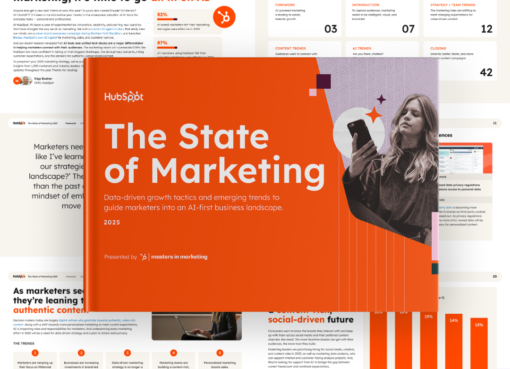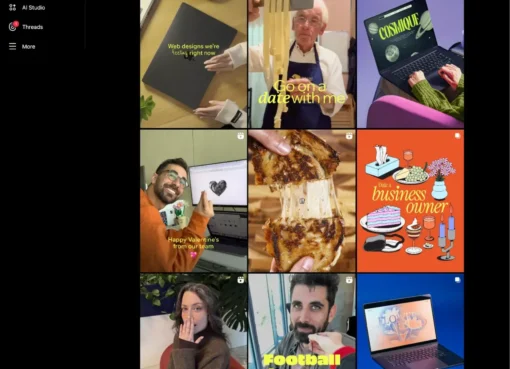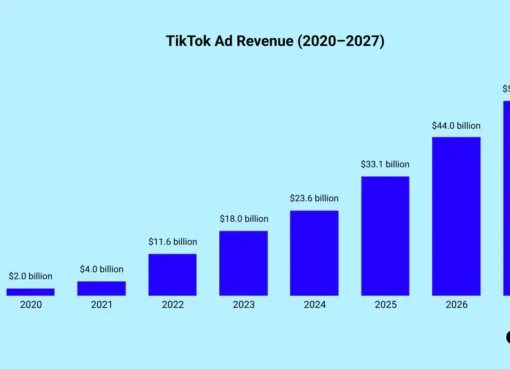The constant question on every social media marketer’s mind is, “What social media trends should I watch out for?”

![Download Now: Free State of Marketing Report [Updated for 2024]](https://blog.contentkrush.com/wp-content/uploads/2024/03/localimages/db725f24-564c-483b-a28c-2d6ff9986516.png)
To learn more about what brands can expect this year and beyond, we surveyed 1,528 marketers to discover which social media trends B2B and B2C businesses are paying attention to.
In addition to reviewing the research, I caught up with a few social media marketing experts to compare the data to what they’re seeing firsthand. So let’s dive into ten of the social media trends to watch, explore, and use in 2024.
The Top 11 Social Media Trends of 2024
- Brands with an engaged social media community will win in 2024.
- Social media is the future of e-commerce.
- Consumers slide into brands’ DMs for customer service.
- Search engines lose steam as consumers turn to social search.
- Influencer marketers ditch celebrities for micro-influencers.
- Short-form video is the highest ROI format and will see the most growth of any trend in 2024.
- Relatable and authentic content will stand out all 2024.
- Instagram is the highest ROI platform and will see the most growth of any social app in 2024.
- Data will drive social media marketing budgets.
- Re-sharing the same content across platforms won’t fly in 2024
- AI will become an increasingly integral part of social media marketing strategies in 2024..
1. Brands with engaged social media communities will win in 2024.
So many clients and companies I talk to think that social media is all about sharing content. But the truth is that’s only half the battle.
Social media is all about relationships and finding new ways to build trust and loyalty with your audience. I often tell people that it’s not enough just to “spray and pray.” You actually have to show up and engage. Otherwise, posting more content just means throwing more stuff out into the air and hoping some of it sticks.
That’s why when I say that creating and sharing content is only half the battle, I mean that building community is the second half. What’s more, I’d even argue that it’s the most important half.
Expert tip: Angela Russo, founder of DreamBuilder CRM shares, “The biggest trend I‘m seeing is longer nurture and conversion cycles, which is why it’s even more important to have a plan/system to be organized and follow up with people to create real connections and build community.”
But what does it mean to build community? In a nutshell, it’s simply connecting and engaging with your audience.
Image Source
How do you know if you have an engaged community? Here are some signs that I recommend keeping an eye out for:
- Unprompted promotion of your brand. Do you have superfans who follow your every move and share your products with their friends? Some people might call these folks brand ambassadors.
- Sharing of your content. Do people share your posts or articles? Does your content go viral either inside or outside of your community?
- Communal celebration of brand milestones and successes. Do people in your circle celebrate your wins and those of everyone else?
- Relationship building rooted in an interest in your brand and/or products. Did your community grow based on people with shared interests or a love of what you do or sell? Does it continue to thrive based on those beginnings?
While not every company with a great, engaged community will exhibit all of these, and there are always other factors, any one of these is a clue that what you’re doing is working.
According to our survey, 86% of social media marketers say building an active online community is crucial to a successful social media strategy in 2024 — and it’s one of their top priorities.
Image Source
Expert tip: Haley Gray, founder of Women’s Entrepreneur Network, a community of over 75,000 entrepreneurs, says, “I’ve found that building a community allows smaller businesses to make sales to businesses and customers that they wouldn’t otherwise have access to. Engaged communities also massively facilitate the sales process, shortening the time to close a deal and increasing the amount per deal.”
Looking at consumer data, it’s easy to see why. Our 2024 social media survey found that 20% of social media users joined an online community in the past three months, while 22% actively participated in one.
In light of this data, where should you build your online community?
Whereas in 2023, social media marketers split evenly between Facebook and Instagram, the importance of video is changing that significantly in 2024. Facebook still ranks highest, but with YouTube right on its heels. Instagram remains important, coming in third, with TikTok ranking a distant fourth place.
That means you have choices, and I always tell people to choose a platform based on where your audience hangs out. If there are a few options, start with the one where you’re most comfortable.
Then, as you diversify and show up in more places, you can use what you’ve learned about their preferences to inform your strategy on other platforms.
What do I mean here? If your target audience prefers to consume content on YouTube, start there and then apply what you’ve learned to the next place they’re likely to hang out.
Expert tip: Tamara Smith, founder of Studio Three 49, shares that what she’s seeing reinforces that we should define success on social by engagement, rather than vanity metrics.
“Between organic user images outperforming polished graphics and users craving community, authentic connection is key. The brands that win big this year will be those who recognize social media is about true connection. Make sure your audience feels seen and knows they matter most,” Smith says.
2. Social media is the future of e-commerce.
Shopping on social media really took off over the past few years. Platforms like Instagram and now TikTok have made it easy to make in-app purchases through shopping tabs, “save later” buttons, and more.
It starts with product discovery. For consumers ages 18 through 54, social media is the preferred channel for finding new products.
As for the purchases, over one in five Gen Z, Millennial, and Gen X social media users bought a product directly in a social media app in the past three months.
Social media marketers have also noticed an uptick in social shopping, with 47% of social media marketers surveyed also reporting in-app sales.
To take it a step further, it’s not just that people will be buying more from social apps. The numbers also show that consumers are increasingly likely to buy from social apps than other places, including a brand’s websites (82%) or third-party websites like Amazon (84%).
Despite these numbers, many consumers are still wary of purchases through social media. According to one HubSpot survey, only 41% of social media users feel comfortable making purchases on social media platforms, and only 37% trust social media platforms with their card information.
The three biggest concerns social media users reported having are:
- The legitimacy of the brand (54%).
- The ability to get a refund (48%).
- The quality of the product (44%).
With platforms using payment integrations like PayPal designed to protect consumers from fraud, it’s getting easier to trust apps for shopping.
Among all the apps offering in-app purchases, Instagram is the one consumers say offers the best shopping experience. Social media marketers also believe it offers the best ROI and marketing tools. However, keep an eye on TikTok. As the TikTok Shop becomes increasingly well known, it’s likely to surge as well in popularity.
If there’s one place to start, the survey suggests that Instagram is the best call. 71% of social media marketers who sell products via social media apps report that Instagram has a high ROI, significantly more than other platforms (the next highest is Facebook, with 63% reporting a high ROI).
3. DMs will be consumers’ preferred customer service channel.
If your brand’s DMs aren’t already flooded with customer service requests, they might be this year.
Image Source
Around one in five Gen Z, Millennial, and Gen X social media users have contacted a brand through DMs for customer service in the past three months. And 88% of social media marketers predict that this will become consumers’ preferred customer service channel in 2024.
It seems like most brands have prepared for this, with 73% of social media marketers saying their company currently offers customer service via social.
Of those companies offering customer service through DMs, 72% say they have a dedicated customer service representative, 62% say it’s a primary responsibility of their job, and 44% shared that automated response tools like chatbots take on this role.
With 20% of social media marketers stating that improving customer service and retention is one of their top goals for 2024, this is your sign to develop a plan for funneling customer service requests via social through the proper channels.
4. Search engines lose steam as consumers turn to social search.
According to our survey, 87% of social media marketers think consumers will search for brands on social media more often than through search engines in 2024.
Our survey found that 22% of consumers between 25 and 34 years old already search for brands on social media platforms more often than through a search engine. This shoots up to 36% among Gen Z.
Image Source
This trend was even confirmed in 2022 by Google’s senior vice president of Knowledge & Information, Prabhakar Raghavan. He said that social platforms were eating up Google’s core products: Search and Maps.
“In our studies, something like almost 40% of young people, when they’re looking for a place for lunch, they don’t go to Google Maps or Search,” said the Google exec. “They go to TikTok or Instagram.”
Raghavan explained that nowadays, young consumers are looking for more visual-rich results and steering away from search engines, which favor text.
So, the question is, how should you optimize your profiles for social search? Here are the top recommendations from social media marketers:
- Including relevant keywords and hashtags in your posts and bio.
- Making sure your username is easy to search for.
- Having a consistent username across accounts.
The bottom line: With 86% of social media marketers sharing that social search is important to their social media marketing strategy, it’s important that every business optimizes its findability on social media.
Expert tip: Debbie Moran of RecurPost says they’re actively embracing social search, focusing on advanced analytics and better content optimization features.
“Our goal is simple: help businesses be seen in social search and also understand and use the helpful insights that come with it,” Moran says.
5. Influencer marketers are ditching celebrities for micro-influencers.
Influencer marketing isn’t going anywhere — 88% of companies using influencer marketing say it’s effective. What’s more, 55% of those surveyed said, “My company will invest more in influencer marketing in 2024.”
But, here’s something I found interesting in the study: 24% of influencer marketers work with small creators or nano influencers (1K to 9,999 followers/subscribers), and 67% work with micro-influencers (10,000-99,999 followers), while just 17% work with accounts over 1 million followers.
So, what’s the biggest factor in choosing who to work with? In the earlier days of influencer marketing, follower count was the main allure. Today, it’s quite different — content quality outshines all other factors. Social media marketers who work with influencers said their top goals are:
- Increasing brand awareness.
- Reaching new audiences.
- Improving brand reputation.
Working with smaller influencers is more affordable, establishes long-term partnerships, and offers access to engaged, tight-knight audiences with whom they have a great deal of trust — in part due to the quality of their content.
So, it’s clear that influencer marketing isn’t going anywhere. 84% of those we surveyed agree that most companies will have a creator or influencer as the face of their brand in 2024. What has shifted is which influencers hold the most value.
Image Source
6. Short-form video is the highest ROI format and will see the most growth of any trend in 2024.
In 2021, we predicted TikTok would have a ripple effect on the social media landscape, and we would see the continued rise of short-form video. In 2024, that trend will continue.
Image Source
Short-form video is Gen Z and Millennials’ preferred format to learn about new products, with 57% of Gen Z and 42% of Millennials preferring to learn about products and their features through short-form video.
As for social media marketers, it’s the most popular format used by 54% of marketers surveyed. In addition, 33% of social media marketers plan to invest more in it than any other format, the highest of any format.
Not only is it popular, but it’s also effective; 83% of those who use it say it’s the most effective format they leverage.
This is likely why 42% of social media marketers who don’t use short-form yet plan on trying it for the first time in 2024, the highest of any format.
7. Funny, authentic, and interactive content will stand out in 2024.
Remember when social media was all about aesthetics? You had to have the highest production value to stand out among the competition. Well, not anymore. While marketers in our survey were split down the middle about high-quality production vs. relatable content, they agree that creating content that is authentic to the brand and brand values matters most.
68% of consumers say social media content being authentic and relatable is more important than polished, high-quality content.
Expert tip: Social media strategist Hira Osama agrees, sharing, “Everyone knows that video is trending. But from what I’ve seen, raw and unfiltered videos are now being watched more often than heavily branded productions. In fact, my clients report that unscripted reels are getting more traction than scripted reels.”
In 2023, the focus was on funny content. And while funny content still remains important, driving the highest ROI, it’s no longer the biggest focus for social media marketers.
So what social media trends are marketers looking to in 2024?
Particularly with the advent of AI, which makes it easier to crank out bulk, impersonal content, marketers are more concerned with creating content that’s relatable, interactive, and reflects your brand’s values. If that can be funny, too, then all the better.
But, even if funny doesn’t always equal relatable, don’t count it out just yet. Most social media marketers aren’t. 59% are planning to increase their investment in funny content, and 38% plan to keep their funny content creation budget about the same.
8. Instagram is the highest ROI platform and will see the most growth of any social app in 2024.
Our survey found that Instagram will see the most growth in 2024, compared to other social platforms.
Wondering why? Well, if you ask social media marketers their favorite social platform, they’ll likely say Instagram. In fact, 92% say they plan to increase or maintain their current investment in Instagram.
They rank it #1 for ROI and quality leads. And it ties with YouTube for the highest engagement levels.
Social media marketers also say Instagram has the most accurate algorithm and the most promising potential for generative AI features, which are essential for brand awareness and reach.
On top of that, 39% of those not yet using it plan to leverage Instagram for the first time this year.
9. Data will drive social media marketing budget justification.
In 2022 and 2023, many marketers faced budget cuts with the threat of a recession looming. In 2024, most marketers don’t expect reductions. On the contrary, 55% say, “I expect my social media marketing budget to increase in 2024.” Another 34% say they expect little change to their budget this year.
However, most of those surveyed indicated that they’re facing more oversight and a greater need to tie their activities to business outcomes.
34% say that it will become more important to use data to drive strategy, and another 33% share that using data to demonstrate ROI and business value of social media efforts will be a top priority in 2024.
Using data to drive decision-making has a place. Although measuring ROI and revenue attribution are challenges social marketers expect to face in 2024, they barely crack the top 10. (More marketers are concerned with creating engaging content, keeping up with algorithm updates, and finding new ideas for content.)
All that to say, the data is important — as is developing a first-party data strategy. However, as long as marketers have a method for tracking the ROI of their social media marketing activities, they’ll be able to identify which strategies are most effective, double down on them, and justify their efforts.
10. Re-sharing the same content across platforms won’t fly in 2024.
Our survey found that social media marketers manage an average of three platforms. Although the benefits of cross-posting are clear, many are starting to steer away from it.
32% believe that tailoring the tone of your content to fit the unique voice of each social media platform will become more important with another 34% placing a higher value on creating content specifically for your audience’s interests and needs.
Our survey found that only 19% of marketers are cross-posting the exact same content. Most are shifting away from a copy-paste approach and instead to a tailored one.
According to our survey, 47% are making tweaks to their content when sharing on various platforms. Meanwhile, over a third are starting from scratch each every time.
So, what types of content come with the highest ROI? Short-form videos ranked highest (according to 71% of those surveyed), with live videos (57%) and VR and AR content (56%) rounding out the top three.
Expert tip: Lori Highby of Keystone Click says, “Video is still hot, hot, hot! We’re seeing a healthy mix of short form and long form video content, while also tying in live video streams.”
She goes on to explain that the beauty of video is that it can be repurposed into many alternative types of media. “By pulling the audio from your video, you can create a podcast. By pulling the transcript, you create a blog post, email, or even an infographic,” Highby says.
What’s more, with AI becoming increasingly prevalent, repurposing content gets so much easier. And that leads me to the 11th trend.
11. AI will become an increasingly integral part of social media marketing strategies in 2024.
For anyone who has been paying attention to generative AI, it comes as no surprise that over a third of social media marketers we surveyed say that using AI tools in your social media marketing strategy will become more important.
After all, 87% of the marketers already using generative AI believe it’s effective. As the capabilities become clearer, that number is likely to grow.
So how many people is that really? A whopping 73% of marketers are already aboard the AI train, with nearly half (49%) saying that AI tools are extensively integrated into their daily workflow.
And, the types of AI run the gamut, including AI chatbots like ChatGPT, AI assistants like Microsoft Co-Pilot, Visual AI tools for images and videos like MidJourney, and audio AI tools for voice and music.
But it’s not just about writing copy, creating images, or repurposing content. Social media marketers are also using AI to brainstorm ideas and improve their concepts and content to fit the brand voice or the tone of different platforms.
Wondering about the most popular social media trends in AI? Short-form videos rank first — with 55% of social media marketers using generative AI to create them. Images, captions, and long-form video creation are close on the heels, used respectively by 48%, 41%, and 40% of those surveyed.
The bottom line on generative AI? Across the board, marketers agree that generative AI is a social media trend that’s here to stay — and will continue to make a significant impact on strategy, content creation, and efficiency.
The Constantly Changing Social Landscape
Although we think we know what to expect with social media, this list of trends is likely not exhaustive of what we’ll see in 2024. After all, world news is impossible to predict — and can make a dynamic impact on social media trends and marketing strategy.
As a social media marketer, the best thing you can do is to continue to research trends, online consumer behaviors, and your team’s social media data to determine which trends or strategies to lean into or how to navigate unprecedented online scenarios.
![11 Social Media Trends Marketers Should Watch in 2024 [New Data]](http://blog.contentkrush.com/wp-content/uploads/2021/06/cropped-ck1.png)

![11 Social Media Trends Marketers Should Watch in 2024 [New Data] 11 Social Media Trends Marketers Should Watch in 2024 [New Data]](https://accesspressthemes.com/import/vmagazine/wp-content/uploads/2018/05/u7-adss.jpg)

![The Best Social Media Platforms for Video Content in 2024 [Consumer Data] the-best-social-media-platforms-for-video-content-in-2024-[consumer-data]](https://blog.contentkrush.com/wp-content/uploads/2024/09/140225-the-best-social-media-platforms-for-video-content-in-2024-consumer-data-510x369.png)

![How to Create a Social Media Report in 7 Simple Steps [+ Free Templates] how-to-create-a-social-media-report-in-7-simple-steps-[+-free-templates]](https://blog.contentkrush.com/wp-content/uploads/2025/01/140773-how-to-create-a-social-media-report-in-7-simple-steps-free-templates-510x369.png)


![Which Social Media Channels are Gaining and Losing Steam in 2024? [New Consumer and Platform Data] which-social-media-channels-are-gaining-and-losing-steam-in-2024?-[new-consumer-and-platform-data]](https://blog.contentkrush.com/wp-content/uploads/2024/04/135458-which-social-media-channels-are-gaining-and-losing-steam-in-2024-new-consumer-and-platform-data-510x369.webp)
![The best social media platforms for video content in 2025 [consumer data] the-best-social-media-platforms-for-video-content-in-2025-[consumer-data]](https://blog.contentkrush.com/wp-content/uploads/2025/05/141452-the-best-social-media-platforms-for-video-content-in-2025-consumer-data-510x369.png)



![The most effective types of content on social media in 2025 [new data] the-most-effective-types-of-content-on-social-media-in-2025-[new-data]](https://blog.contentkrush.com/wp-content/uploads/2025/05/141516-the-most-effective-types-of-content-on-social-media-in-2025-new-data-510x369.png)


![How (& Where) Consumers Discover Products on Social Media [New Data] how-(&-where)-consumers-discover-products-on-social-media-[new-data]](https://blog.contentkrush.com/wp-content/uploads/2024/09/140199-how-where-consumers-discover-products-on-social-media-new-data-510x369.webp)










Comment here